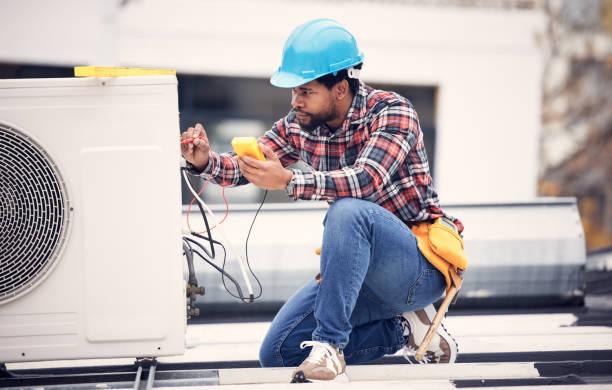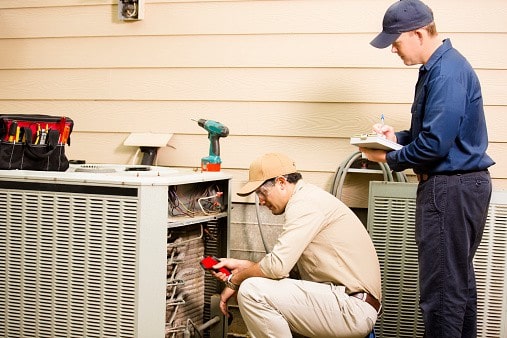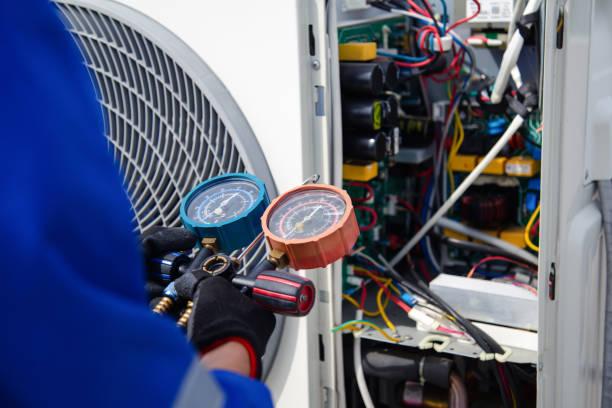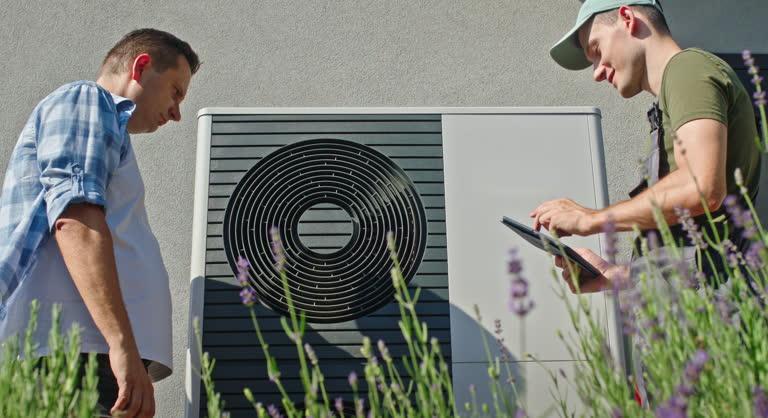Your air conditioner stops working on the hottest day of summer. Your furnace fails during a winter freeze. When HVAC emergencies strike, choosing the wrong repair company can transform a simple fix into a costly nightmare. In Houston’s extreme climate, where temperatures regularly soar above 95°F and humidity levels hover around 75%, selecting the right HVAC repair company isn’t just about comfortit’s about protecting your home investment and your family’s well-being.
Every year, homeowners lose thousands of dollars to unqualified technicians, unnecessary repairs, and predatory pricing. According to the Better Business Bureau, HVAC contractors consistently rank among the top complaint categories, with over 13,000 complaints filed nationally in 2024 alone. The difference between a trustworthy HVAC company and an unreliable one can mean saving hundreds on repairs, extending your system’s lifespan by years, and avoiding the frustration of repeated service calls.

Why Choosing the Right HVAC Repair Company Matters
The average homeowner spends between $150 and $450 on typical HVAC repairs, but poor workmanship can escalate costs exponentially. When inexperienced technicians misdiagnose problems or use substandard parts, what should be a minor repair can evolve into complete system replacement costing $5,000 to $12,000.
Professional HVAC repair extends far beyond fixing immediate problems. Qualified technicians identify underlying issues that, if left unaddressed, lead to catastrophic failures. They optimize system efficiency, potentially reducing energy bills by 20-40% according to Energy Star data. Most importantly, they ensure your system operates safely, preventing carbon monoxide leaks, electrical hazards, and fire risks that claim hundreds of lives annually.
Consider this real scenario: A Houston homeowner hired an unlicensed technician advertising rock-bottom prices on social media. The technician “fixed” a refrigerant leak by simply adding more coolanta temporary band-aid that masked the real problem. Three months later, the compressor failed completely due to contamination from the ongoing leak. What started as a $300 repair ballooned into a $3,500 compressor replacement, plus the environmental damage from leaked refrigerant.
Question 1: Are You Licensed and Insured?
This fundamental question should be your starting point. In Texas, HVAC contractors must hold a state-issued license demonstrating they’ve passed competency exams and maintain continuing education. Licensed contractors carry minimum liability insurance of $300,000 and often maintain policies exceeding $1 million.
What to Look For in Licensing
Request the contractor’s TDLR (Texas Department of Licensing and Regulation) license number. Verify it instantly on the TDLR website, checking for active status and any disciplinary actions. Licensed contractors display their numbers prominently on vehicles, websites, and documentation.
Insurance protects both you and the contractor. General liability coverage shields you from property damage claims, while workers’ compensation protects you from lawsuits if technicians are injured on your property. Ask for certificates of insurance directly from the insurance provider, not photocopies the contractor provides.
Question 2: How Long Have You Been in Business?
Industry statistics reveal that 80% of HVAC companies fail within their first five years. Companies like 75 Degree AC, established in 2016 with technicians bringing decades of combined experience, demonstrate the stability and expertise you need.
Longevity indicates financial stability, technical competence, and customer satisfaction. Established companies maintain relationships with equipment manufacturers, accessing technical support and genuine parts. They understand local climate challenges, building codes, and common regional HVAC issues.

Experience Matters in Complex Repairs
Veteran technicians recognize subtle symptoms inexperienced ones miss. They’ve encountered thousands of system variations, understanding how different brands, models, and configurations behave. This expertise translates into accurate diagnostics, appropriate repairs, and honest recommendations about when replacement makes more financial sense than continued repairs.
Question 3: Can You Provide References and Reviews?
Legitimate HVAC companies eagerly share customer testimonials and maintain strong online reputations. Check multiple review platforms including Google, Yelp, BBB, and Angie’s List. Look for patterns in feedbackconsistent praise for punctuality, fair pricing, and quality work indicates reliability.
Request references from recent customers with similar systems or repairs. Quality contractors maintain detailed service records and can quickly provide relevant references. When contacting references, ask specific questions:
- Did the company arrive on time and complete work as scheduled?
- Were the initial diagnosis and quote accurate?
- Did the repair resolve the problem completely?
- How did they handle any unexpected issues or costs?
- Would you hire them again?
Question 4: What’s Included in Your Service Call?
Transparent companies provide detailed, written estimates before beginning work. The initial service call, typically ranging from $75 to $200, should include comprehensive system inspection, accurate diagnosis, and clear explanation of problems and solutions.
Understanding Service Call Components
| Service Component | What to Expect | Red Flags |
|---|---|---|
| Initial Inspection | 30-60 minute thorough evaluation | 5-minute “quick look” diagnosis |
| Diagnosis | Specific problem identification with evidence | Vague “it’s broken” explanations |
| Written Estimate | Itemized parts and labor costs | Verbal quotes only |
| Options Presented | Multiple repair/replacement scenarios | Single expensive option pushed |
| Timeline | Clear completion schedule | Open-ended timeframes |
Professional technicians explain findings in understandable terms, showing you problematic components and explaining how repairs will resolve issues. They should never pressure immediate decisions or use scare tactics about system safety unless genuine dangers exist.
Question 5: Do You Offer Emergency Services?
HVAC emergencies don’t follow business hours. When your AC fails during a Houston heatwave or your heating stops during a rare freeze, waiting until Monday isn’t an option. Reliable companies offer 24/7 emergency AC repair services with reasonable response times.

Emergency service availability indicates a company’s commitment to customer care and operational capacity. Companies offering true 24/7 service maintain on-call technicians, stocked service vehicles, and dispatch systems ensuring rapid response. Expect to pay premium rates for after-hours servicetypically 1.5 to 2 times normal ratesbut beware of companies charging excessive emergency fees exceeding industry standards.
What Constitutes an HVAC Emergency?
Understanding true emergencies helps you avoid unnecessary emergency service charges:
- Complete system failure during extreme weather (over 90°F or under 40°F)
- Gas leaks or strong fuel odors near heating equipment
- Electrical burning smells or visible sparking from HVAC components
- Water leaks causing active property damage
- Carbon monoxide detector activation near heating equipment
Question 6: What Warranties Do You Provide?
Reputable HVAC companies stand behind their work with comprehensive warranties. Industry standards include labor warranties of 90 days to one year and parts warranties matching manufacturer terms, typically one to ten years depending on components.
According to HVAC industry research, companies offering strong warranties experience 40% fewer callbacks and maintain 25% higher customer satisfaction ratings. Warranties demonstrate confidence in workmanship and commitment to customer satisfaction.
Understanding Warranty Coverage
Labor warranties cover the technician’s work, ensuring proper installation and repair techniques. If the same problem recurs within the warranty period, the company returns at no charge. Parts warranties, typically provided by manufacturers, cover component failures but may not include labor for replacement.
Extended warranties and service agreements offer additional protection. Many companies provide preventive maintenance plans including annual tune-ups, priority service, and repair discounts. These agreements, typically costing $150-$500 annually, can prevent costly breakdowns and extend equipment life.
Question 7: How Do You Price Your Services?
Transparent pricing practices distinguish professional HVAC companies from questionable operators. Legitimate contractors provide clear pricing structures, whether using flat-rate pricing or time-and-materials billing.
Flat-Rate vs. Hourly Pricing
Flat-rate pricing provides upfront costs for specific repairs, eliminating surprises regardless of completion time. This model, used by many established companies, protects customers from inefficient technicians or unexpected complications. Hourly pricing, typically ranging from $75 to $150 per hour plus parts, may benefit simple repairs but can escalate for complex issues.
Quality contractors provide written estimates before beginning work, clearly itemizing:
- Diagnostic fees (often waived if you proceed with repairs)
- Labor costs broken down by task
- Parts costs with part numbers and descriptions
- Any additional fees (disposal, permits, emergency charges)
- Payment terms and accepted methods

Additional Factors to Consider
Technician Training and Certification
Beyond company licensing, individual technicians should hold NATE (North American Technician Excellence) certification, EPA Section 608 certification for refrigerant handling, and manufacturer-specific training for brands they service. Ongoing training ensures technicians stay current with evolving technology and efficiency standards.
Equipment and Technology
Modern HVAC diagnosis requires sophisticated tools including digital manifolds, thermal imaging cameras, and combustion analyzers. Companies investing in proper equipment demonstrate commitment to accurate diagnosis and quality service. Ask what diagnostic tools technicians use and how they verify repair success.
Environmental Responsibility
Responsible HVAC companies properly recover and recycle refrigerants, preventing environmental damage. They recommend energy-efficient solutions reducing your carbon footprint and utility costs. Look for companies participating in utility rebate programs and promoting Energy Star certified equipment.
Red Flags to Avoid
Recognizing warning signs helps you avoid problematic contractors:
- Extremely low prices – Significantly undercutting competitors often indicates unlicensed work or hidden charges
- Cash-only payment – Legitimate businesses accept checks and cards, providing transaction records
- No physical address – Established companies maintain offices or shops, not just P.O. boxes
- High-pressure sales tactics – Pushing immediate decisions or unnecessary upgrades
- Lack of documentation – No written estimates, invoices, or warranty information
- Frequent company name changes – May indicate reputation problems or legal issues
Making Your Final Decision
After asking these seven critical questions, evaluate responses holistically. The lowest price rarely represents the best value. Consider the company’s professionalism, communication clarity, and willingness to educate you about your system.
Create a comparison chart rating each company on licensing, experience, reviews, pricing transparency, warranty coverage, and overall professionalism. Weight factors based on your prioritiesemergency availability might outweigh price for older systems prone to failure, while warranty coverage matters more for newer equipment.

The Value of Building a Long-Term Relationship
Establishing a relationship with a trustworthy HVAC company provides benefits beyond individual repairs. Regular service from familiar technicians ensures consistent quality and system knowledge. Companies maintain detailed service histories, tracking patterns and anticipating potential issues. Long-term customers often receive priority scheduling, loyalty discounts, and honest recommendations about repair-versus-replacement decisions.
Your HVAC system represents one of your home’s largest investments, typically costing $5,000 to $10,000 for complete replacement. Proper maintenance and timely repairs can extend system life from the average 10-15 years to 20 years or more. Choosing the right HVAC repair company protects this investment while ensuring your family’s comfort and safety.
Frequently Asked Questions
How often should I have my HVAC system serviced?
HVAC systems require professional maintenance twice yearlyspring for cooling systems and fall for heating systems. This schedule ensures peak efficiency, prevents breakdowns, and maintains warranty coverage. Regular tune-ups can reduce energy costs by up to 30% and extend equipment life significantly.
What’s the average cost for common HVAC repairs?
Typical repair costs vary by issue: capacitor replacement ($150-$400), refrigerant recharge ($200-$550), blower motor repair ($450-$900), and compressor replacement ($1,500-$3,500). Costs depend on system type, part availability, and labor rates in your area. Always get written estimates before approving repairs.
Should I repair or replace my HVAC system?
Consider replacement when repair costs exceed 50% of new system value, your system exceeds 10-15 years old, or you face frequent breakdowns. Energy savings from new, efficient systems often offset replacement costs within 5-7 years. Consult trusted technicians for honest assessments based on your specific situation.
Can I perform HVAC maintenance myself?
Homeowners can handle basic maintenance like filter changes, keeping outdoor units clear, and monitoring thermostat operation. However, professional maintenance involving electrical components, refrigerant, gas connections, or internal mechanisms requires licensed technicians for safety and warranty preservation.
How quickly should an HVAC company respond to service calls?
For non-emergency calls, expect same-day or next-day service from quality companies. Emergency services should respond within 2-4 hours. During peak seasons, response times may extend, making preventive maintenance crucial for avoiding emergency situations.
Conclusion: Your HVAC Company Choice Matters
Selecting the right HVAC repair company impacts your comfort, safety, and finances for years to come. By asking these seven essential questionsverifying licensing and insurance, evaluating experience, checking references, understanding service offerings, confirming emergency availability, reviewing warranties, and clarifying pricingyou protect yourself from costly mistakes and ensure quality service.
Remember that the cheapest option rarely provides the best value. Professional HVAC companies invest in training, equipment, insurance, and customer service, costs reflected in fair pricing. The money you save choosing unqualified technicians disappears quickly through repeat service calls, premature system failure, and potential property damage.
In Houston’s demanding climate, your HVAC system works harder than almost anywhere else in the country. It deserves professional care from qualified technicians who understand local challenges and stand behind their work. Take time to research companies thoroughly, ask tough questions, and choose partners committed to your long-term comfort and satisfaction.
Ready to experience the difference a professional HVAC company makes? Contact 75 Degree AC at (713) 598-2737 for transparent pricing, certified technicians, and service you can trust. Schedule your AC installation or repair consultation today and join thousands of satisfied Houston homeowners who never worry about their HVAC systems again.
